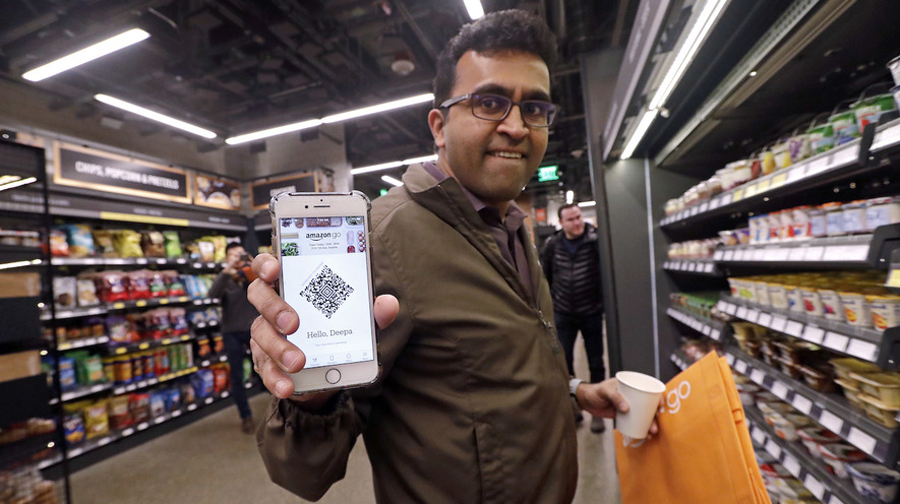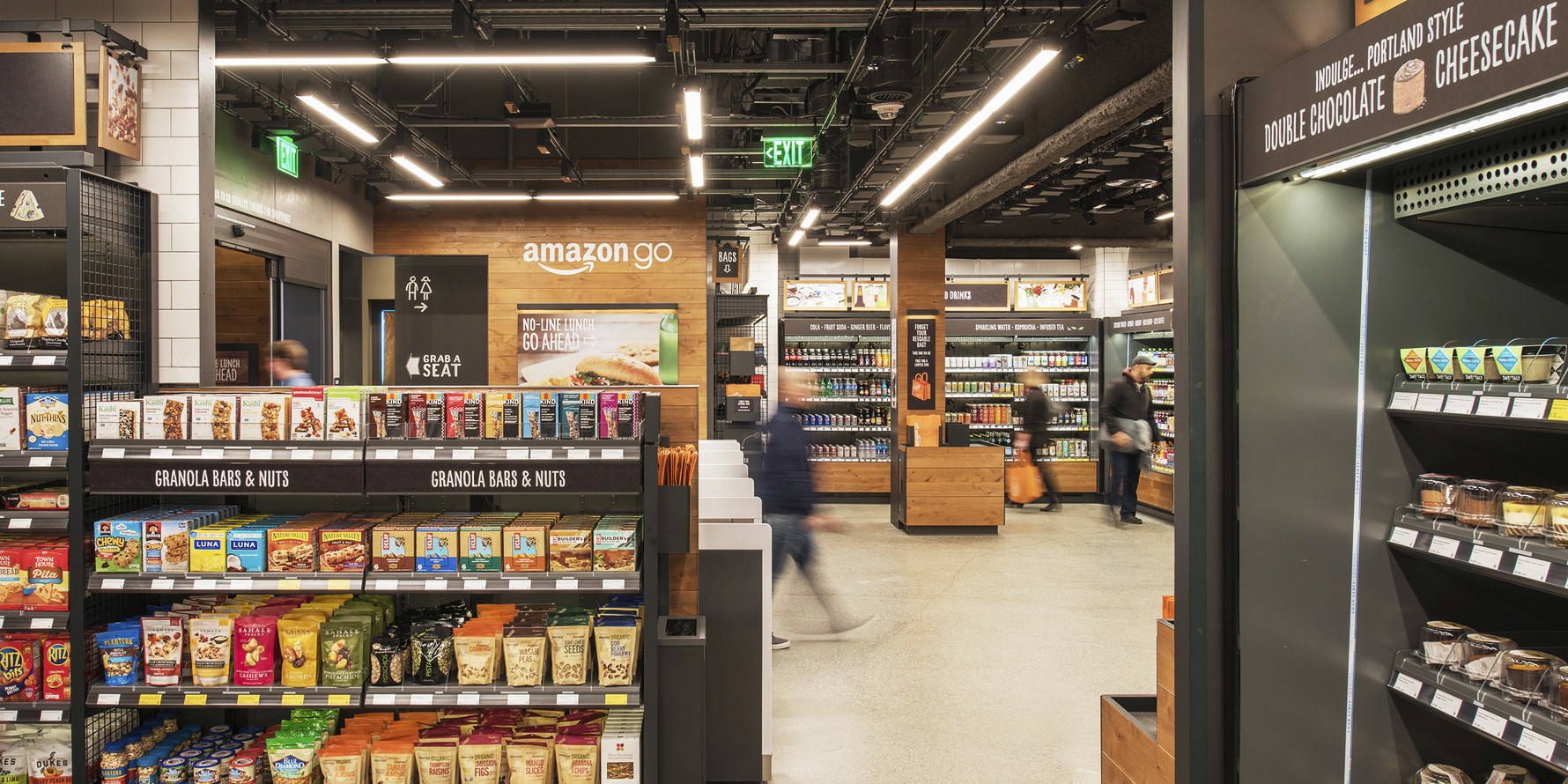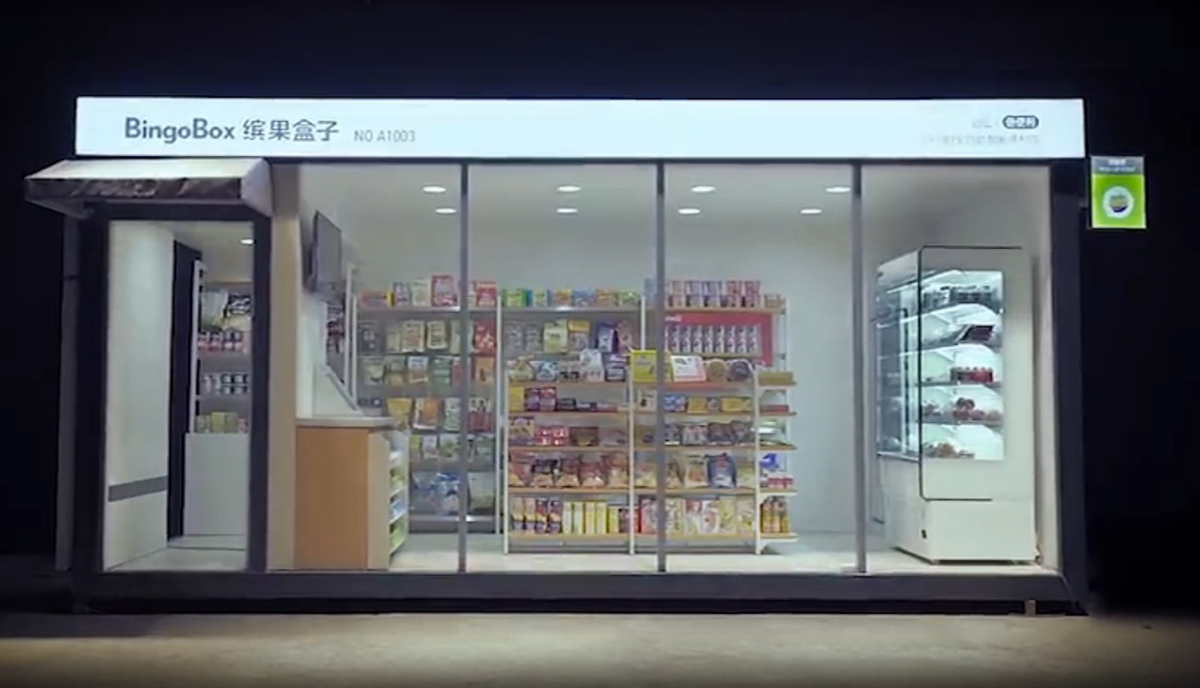Why cities oppose Amazon Go, the first non-cash stores

Amazon is tired of dominating the online market only. After opening their first unique store without cash desks in Seattle at the beginning of last year, these IT giant supermarkets, tracking your purchases with AI and cameras, began to appear in many major cities in America. The company plans to seize all offline retail in general, having opened at least 3000 more of these automatic supermarkets in the USA in the coming years. But not everyone likes this movement into the future. For some reason, many cities and even entire states are trying to ban Amazon Go from appearing on its territory.
Experts fear that the appearance of such a major player in this area could jeopardize thousands of small stores, large chains like 7-Eleven and even fast food restaurants with pizzerias. Jeff Bezos says this is an opportunity for Amazon to revolutionize offline trading — just like they did with online sales in the early 2000s.
With the news that Amazon Go will expand across all US cities, the stocks of the largest supermarkets - Walmart, Target, Kroger - in 2018 fell by 3-4%. With three thousand of its points in America, Amazon Go can become one of the largest retail chains in the country. The expansion plan was also chosen very aggressive: 10 stores now, 50 - by the end of 2019, several hundred in 2020, and immediately, a boom, three thousand by 2021. Amazon is going to spend more than $ 3 billion on this plan - on cameras and other equipment needed to operate customer tracking systems. The amount may seem astronomical. But in reality, this is a penny compared to the annual operating expenses of the company, which amounted to $ 200 billion only in 2018.

And you can get a very good jackpot here. There are now 156,000 stores and shops in the United States. About 125,500 of them are at gas stations. And they buy products (except fuel) for $ 350 billion annually. If Amazon manages to grab a piece of this pie, and even with minimal labor, its position in the ranking of the most influential American companies will become even stronger.
Crowd of imitators
A year after the appearance of the first Amazon Go, which proved the reality and success of the concept, in many countries, states and cities he managed to have competitors. Young start-ups and established industry giants are working together to prevent Amazon from picking up a new market. Some of them even lobby for themselves before the City Councils (just like in every major US city they make local startups for renting electric scooters).

Of course, no one thinks that Bezos can be defeated “in the forehead”. Each startup has its own chip, thanks to which they expect to overtake Amazon. For example, Mighty AI, although based in Seattle, moved to Detroit to be closer to the offices of all car companies. They are now working on software that allows unmanned vehicles to distinguish objects in the real world. The start-up hopes that communication with them will help him improve the software for cameras in the same “unmanned” supermarkets.
Walmart is trying to develop the technology on its own, and Kroger has requested the assistance of Microsoft, and expects to increase revenue by at least $ 400 million with new technology by 2020.

California AiFi goes even further than Amazon Go. Her prototype store, presented a couple of months ago in New York, is fully automatic. Bezos has so far only automatic payment - so that people do not need to carry their wallet or punch all the goods. But employees still have to fill the shelves in the supermarket, and these are potential human errors. At AiFi, filling is also carried out by a mechanism, as in a large vending machine. The area of the test site is about 15 square meters, and people are needed only at the stage of its installation.
Michael Suswal, co-founder of Standard Cognition startup, famous for developing AI to identify thieves even before it was stolen, says Amazon just became the catalyst for the new move:
Technology stores without cash registers have ripened in any case. Developments in machine vision and artificial intelligence have reached the right level. Amazon simply attracted attention to this area, brought it to the mainstream. The launch of Amazon Go and all this Whole Foods purchase made people, especially the top management of supermarkets, really think. Everyone understood that innovation needed to be introduced sooner, otherwise you would be left on the sidelines.
Investors also showed a strong interest in the new field. Start-ups involved in store automation poured $ 111 million (!) In 2018. For comparison, two years before this, the amounts were estimated in thousands of dollars, and companies that received $ 400 thousand were considered lucky. And now it has come to the point that now in San Francisco a new test “automatic” store opens on average every two weeks from the next startup.

A 24/7 non-employee store in China. 500 bingoboxes have already been installed throughout the country
The minimum program for each of them, says Michael Suswal, is to be sold by the same Amazon. The maximum program is to create and patent a technology that no supermarket can do without in the near future.
Why are cities against
Many cities and states resist the discovery of Amazon Go or its followers. Critics say technology further widens the gap between the rich and the poor. And there are three problems at once. Firstly, they do not have cashiers, and sometimes many other categories of workers, such stores are only interested in IT staff to improve the quality of software. And this means even less work for those who are already tight with her.

Secondly, many do not like total surveillance of citizens, especially from private companies. After the Facebook scandal, who will guarantee that Bezos will one day not want to trade videos of all your visits to his supermarkets? Suddenly you become famous for something, and then it turns out that you bought baby food when you have no children? Or do you take alcohol regularly on Fridays? Or once ordered a pack of super-small condoms? Here you have an article for the yellow tabloid!
Finally, thirdly, and most importantly, such stores do not accept cash. That is their whole point: to provide the simplest shopping experience. And as a result, city councils are worried, the homeless and destitute (as well as small children) will not even be able to buy anything from them.

In March, New Jersey banned most types of strictly cashless stores. In February, Philadelphia passed the same law . Since 1978, Massachusetts has prohibited any “discrimination” against customers using cash. San Francisco, Chicago, Washington, and New York are set to join this year.
Their main argument against “car dealerships” is that the most disadvantaged sections of the population do not have apps on smartphones or credit cards. Yes, digital payments reduce transaction time, they are convenient, the risks of theft are reduced, and the speed of movement of customers at the exit is increased. But all these are issues of small convenience for the middle class, while poor people face a real problem. Now they not only do not have enough money for food, the number of points at which they can physically buy it is reduced.
In 2018, 6.5% of adult Americans did not have a bank account. Another 19% owned the account, but did not use it for any operations, except for microloans and cashing checks. Even people with stable incomes often decide not to open an account - not to succumb to the temptations of lending or to pay a monthly fee. The homeless have even more serious problems: many simply do not have documents to open an account. Obtaining a new ID can take several months, and about three million Americans involved in survival issues decide not to get stuck in this red tape.

City councils are afraid that if stores like Amazon Go start to win conventional supermarkets, the cache will remain the lot of street stalls, and even then not for long. Many restaurants also do not accept cash - this can reduce up to 10% overhead. In five years, analysts at Crone Consulting predict that more than a third of retail will become non-cash (instead of 17% in the US at the moment). Restaurants and automatic supermarkets will be open only to the "wealthy" - with a bank account and good credit history. Economists in the States even propose introducing a special term for this - "discrimination of the poor."

Meanwhile, even street vendors have non-cash payments in China
Many countries openly welcome cashless payments and cashless supermarkets. Nearly half of Chinese people use mobile phones to pay for purchases. In India, the government is promoting digital payments as a way to fight corruption. In Sweden, the most non-cash state in the world, in 2018 only 25% of citizens paid at least once a week for something with paper money. The remaining 75% cost only non-cash.
The United States, despite the seemingly general technical advancement of the population, is not one of these countries. Why - explains Mersa Baradaran , professor at the University of Georgia and author of the popular book on the Color Money financial system:
America is a rather strange state in this regard. Historically, we have a lot of competition, and banks do not give bills to many people with low incomes. In many places outside the city, there are simply no bank branches. We have a largely divided society, in which poverty is more pronounced than in most other countries. There are poor countries where the Internet is on average better, the quality of mobile communications is higher, or there are more non-cash payments. Our state does not prioritize this infrastructure.

Cash in Sweden
Too fast the transition to new technologies, such as automatic stores and contactless payments, leaves certain sections of society out of the picture. Now even Sweden wants to apply the brake. Two weeks ago, the state decided to issue a decree requiring banks to process and issue cash currency. People in the country are afraid that cash too quickly disappears from everyday life, and this may create difficulties for those who have not had time to "go into the information age", for example, the elderly and residents of the outback.
And how do you think, is it worth it? Do we make life difficult for those who already have it? Or are all these prohibitions of promising technologies - is this modern Luddism?
PS Buying in the USA is profitable with Pochtoy.com. Delivery with us - from $ 11.99 per pound. We even pay extra for new customers ! A $ 1 bonus for each kilogram sent. And all Habr readers after registration receive a 7% discount on delivery by HABR code.

